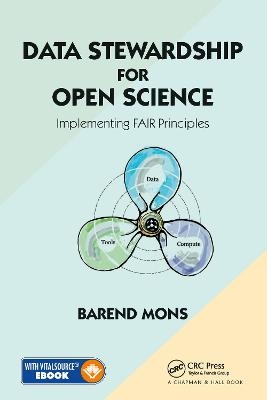
Data Stewardship for Open Science
Implementing FAIR Principles
Seiten
2021
Chapman & Hall/CRC (Verlag)
978-1-032-09570-7 (ISBN)
Chapman & Hall/CRC (Verlag)
978-1-032-09570-7 (ISBN)
This book makes readers aware of the need, complexity, and challenges associated with open science, modern science communication, and data stewardship.
Data Stewardship for Open Science: Implementing FAIR Principles has been written with the intention of making scientists, funders, and innovators in all disciplines and stages of their professional activities broadly aware of the need, complexity, and challenges associated with open science, modern science communication, and data stewardship. The FAIR principles are used as a guide throughout the text, and this book should leave experimentalists consciously incompetent about data stewardship and motivated to respect data stewards as representatives of a new profession, while possibly motivating others to consider a career in the field.
The ebook, avalable for no additional cost when you buy the paperback, will be updated every 6 months on average (providing that significant updates are needed or avaialble). Readers will have the opportunity to contribute material towards these updates, and to develop their own data management plans, via the free Data Stewardship Wizard.
Data Stewardship for Open Science: Implementing FAIR Principles has been written with the intention of making scientists, funders, and innovators in all disciplines and stages of their professional activities broadly aware of the need, complexity, and challenges associated with open science, modern science communication, and data stewardship. The FAIR principles are used as a guide throughout the text, and this book should leave experimentalists consciously incompetent about data stewardship and motivated to respect data stewards as representatives of a new profession, while possibly motivating others to consider a career in the field.
The ebook, avalable for no additional cost when you buy the paperback, will be updated every 6 months on average (providing that significant updates are needed or avaialble). Readers will have the opportunity to contribute material towards these updates, and to develop their own data management plans, via the free Data Stewardship Wizard.
Barend Mons is a molecular biologist by training (PhD, Leiden University, 1986) and spent over 15 years in malaria research. After that he gained two decades of experience in computer-assisted knowledge discovery, which is still his research focus at the Leiden University Medical Centre.
Introduction. Data cycle step 1: Design of experiment. Data cycle step 2: Data design and planning. Data cycle step 3: Data Capture (equipment phase). Data cycle step 4: Data Processing and Curation. Data cycle step 5 Data Linking and ‘Integration’. Data cycle step 6: Data Analysis, Interpretation. Data cycle step 7: Information and insight in publishing.
| Erscheinungsdatum | 01.07.2021 |
|---|---|
| Zusatzinfo | 19 Illustrations, black and white |
| Sprache | englisch |
| Maße | 156 x 234 mm |
| Gewicht | 358 g |
| Themenwelt | Mathematik / Informatik ► Informatik ► Datenbanken |
| Mathematik / Informatik ► Informatik ► Theorie / Studium | |
| Mathematik / Informatik ► Mathematik | |
| Naturwissenschaften ► Biologie | |
| Wirtschaft ► Volkswirtschaftslehre ► Ökonometrie | |
| ISBN-10 | 1-032-09570-9 / 1032095709 |
| ISBN-13 | 978-1-032-09570-7 / 9781032095707 |
| Zustand | Neuware |
| Haben Sie eine Frage zum Produkt? |
Mehr entdecken
aus dem Bereich
aus dem Bereich


